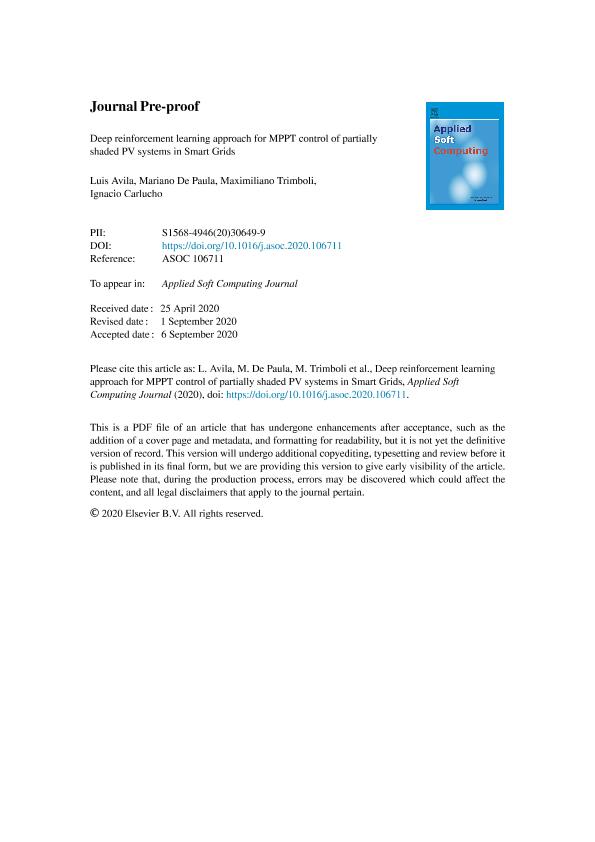Artículo
Deep reinforcement learning approach for MPPT control of partially shaded PV systems in Smart Grids
Fecha de publicación:
12/2020
Editorial:
Elsevier Science
Revista:
Applied Soft Computing
ISSN:
1568-4946
Idioma:
Inglés
Tipo de recurso:
Artículo publicado
Clasificación temática:
Resumen
Photovoltaic systems (PV) are having an increased importance in modern smart grids systems. Usually, in order to maximize the energy output of the PV arrays a maximum power point tracking (MPPT) algorithm is used. However, once deployed, weather conditions such as clouds can cause shades in the PV arrays affecting the dynamics of each panel differently. These conditions directly affect the available energy output of the arrays and in turn make the MPPT task extremely difficult. For these reasons, under partial shading conditions, it is necessary to have algorithms that are able to learn and adapt online to the changing state of the system. In this work we propose the use of deep reinforcement learning (DRL) techniques to address the MPPT problem of a PV array under partial shading conditions. We develop a model free RL algorithm to maximize the efficiency in MPPT control. The agent's policy is parameterized by neural networks, which take the sensory information as input and directly output the control signal. Furthermore, a PV environment under shading conditions was developed in the open source OpenAI Gym platform and is made available in an open repository. Several tests are performed, using the developed simulated environment, to test the robustness of the proposed control strategies to different climate conditions. The obtained results show the feasibility of our proposal with a successful performance with fast responses and stable behaviors. The best results for the presented methodology show that the maximum operating power point achieved has a deviation less than 1% compared to the theoretical maximum power point.
Palabras clave:
DEEP RL
,
MPPT
,
OPENAI GYM
,
PV SYSTEMS
Archivos asociados
Licencia
Identificadores
Colecciones
Articulos(CIFICEN)
Articulos de CENTRO DE INV. EN FISICA E INGENIERIA DEL CENTRO DE LA PCIA. DE BS. AS.
Articulos de CENTRO DE INV. EN FISICA E INGENIERIA DEL CENTRO DE LA PCIA. DE BS. AS.
Citación
Avila, Luis Omar; de Paula, Mariano; Trimboli, Maximiliano Daniel; Carlucho, Ignacio; Deep reinforcement learning approach for MPPT control of partially shaded PV systems in Smart Grids; Elsevier Science; Applied Soft Computing; 97; 12-2020; 1-39
Compartir
Altmétricas




